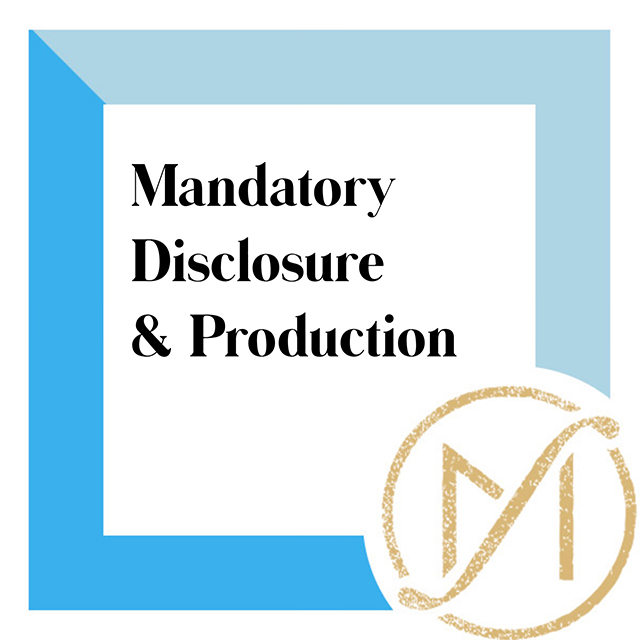Mandatory Disclosure and Production in Connecticut Family Law

Mandatory Disclosure and Production is one of the earliest stages of discovery in many Connecticut family law matters. It is a part of multiple types of family law matters, including:
- Divorce (Dissolution of Marriage)
- Legal Separation
- Annulment
- Child Support
- Post Judgment Modification of Child Support
- Post Judgment Modification of Alimony
What Is Mandatory Disclosure and Production?
There are rules in Connecticut that describe the documents that the parties both exchange in most types of Connecticut family law matters that involve financial issues. The family court rules refer to this list of documents as Mandatory Disclosure and Production. Mandatory Disclosure and Production is part of the Discovery trial process.
Read: Discovery in Connecticut Divorces
What Other Names Do People Use for Mandatory Disclosure and Production?
Lawyers love acronyms (“LLA”), so Mandatory Disclosure and Production is also frequently referred to as “MDP.” (See what we did there?)
Since MDP is standard in so many cases, it’s also often called “standard discovery.”
What Is Discovery?
Discovery is the name for the process of exchanging information between the parties to a lawsuit about the witnesses and evidence they will present at trial. In the American system, the goal is that both parties understand each other’s evidence and witnesses prior to trial. If parties don’t learn about evidence until trial — sometimes referred to as “trial by ambush” — they don’t have time to obtain responsive evidence.
Because divorce and family law litigation is so personal, it is easy to forget that it is a formal lawsuit. Similarly, it can be easy to forget that, like any lawsuits, divorce and family law matters will result in a trial if the spouses aren’t able to reach a settlement outside of court. Even though discovery is a formal part of the court process leading up to trial, the exchange of discovery is very useful to resolving cases. First of all, discovery is what allows your divorce attorney to fully understand the full picture and evidence in your case. This allows her to give you her best insights and advice. It’s also important to note that settlement discussions cannot begin in earnest until the lawyers have their arms around what needs to be decided. Discovery fosters that, and the spouses’ Financial Affidavits and MDP are excellent starting places.
Read: Key Things To Know About the Financial Affidavit
Read: Settlement & Divorce
What Is Included in Standard Family Law Discovery?
MDP includes:
- All federal and state income tax returns filed within the last three years. (Personal returns and returns filed on behalf of any partnership or closely held corporation where spouses are partners or shareholders.)
- IRS forms W-2, 1099 and K-1 within the last three years.
- Pay stubs or other evidence of income for the current year and spouses’ last pay stubs from the past year.
- Statements for all accounts maintained with any financial institution, including banks, brokers and financial managers, for the past 24 months.
- Most recent statement showing any interest in any Keough, IRA, profit sharing, deferred compensation plan, pension plan, or retirement account.
- Most recent statements regarding any life insurance.
- A summary of medical insurance policy, coverage and cost of coverage; spousal benefits, and COBRA costs from spouses’ employers.
- Any written appraisals completed of spouses’ homes or other property.
Is MDP Required?
If one party requests standard discovery, both parties must exchange it. In other words, Mandatory Disclosure and Production is “reciprocal” — when you request it you must also provide it.
In order to avoid complying with a proper request for MDP, you need to prove to the court that there is “good cause” for why it should not be exchanged.
Will There Be More Discovery After Mandatory Disclosure and Production?
It depends on the particulars of each case. We refer to anything beyond the financial affidavit and mandatory disclosures as “expanded discovery.”
Expanded discovery can involve documents in addition to the mandatory disclosure documents, or other discovery tools you may have heard of, such as:
- depositions
- interrogatories
- requests for admission
In addition, one one of the spouses owns a business — such as in many high net worth divorces — there may be a business valuation completed.
Read: Depositions & Divorce
Read: Requests for Admission & Divorce
When and Why Is My Ex Entitled to My Financial Information After We’re Divorced?
Sometimes it surprises people that this type of discovery is also mandatory post-judgment, or following a divorce. Many people feel that following a divorce or custody action, their ex should no longer be entitled to this type of financial information. The reason that Connecticut law does require this exchange on financial post-judgment modifications is the need to understand the full, current financial picture in order to assess any proposed modification. When you look at the family law case types that require standard discovery, you’ll see that they involve financial issues. For example, if someone files a post-judgment custody contempt without any financial issues like child support, MDP isn’t triggered. Note this doesn’t mean that there won’t be any discovery.
Read: Small Business & Divorce
Next Steps
For more information about Connecticut divorce and family law, check out our Divorce Information and Facts.








